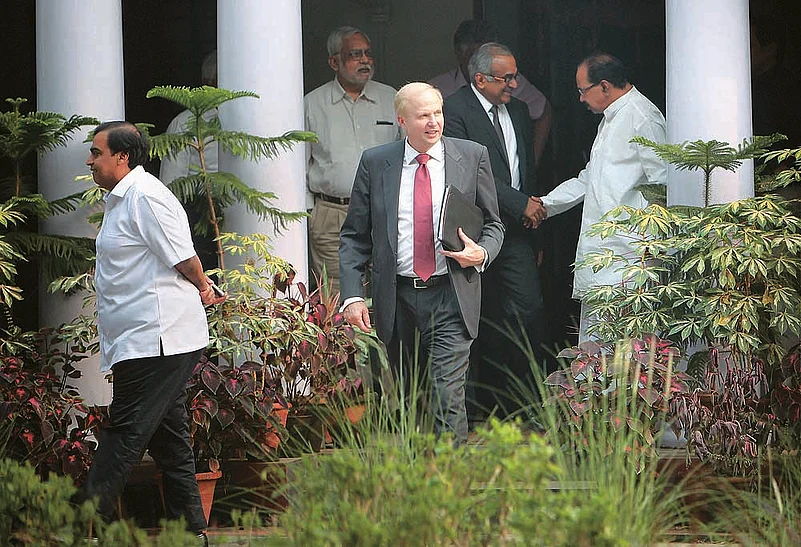
The shadow-boxing between the Union petroleum ministry and Reliance Industries Ltd (RIL) took a decisive turn in late October. Or did it really? Here are the facts: RIL has been asked to relinquish 81 per cent of the 7,645 sq km in the KG-D6 block allotted to it in June 2000. That’s 6,198.88 sq km, including five discoveries with some 805 billion cubic feet (BCF) of gas reserves.
On the face of it, this looks like a setback for RIL in its high-octane war with various government arms over falling gas production from its blocks. But as Outlook’s continuing investigations into the great gas heist reveal, the buzz is around the area RIL is being allowed to retain—including three discoveries over which the operators of the block (RIL, BP and Niko Resources) and the exploration regulator directorate general of hydrocarbons (DGH) are on different sides of the fence.
The petroleum ministry is yet to decide whether to allow Reliance to hold on to 298 sq km where the three discoveries—D29, D30 and D31—have been made. According to initial estimates, the three together hold 348 BCF in gas reserves. “About these remaining three discoveries, the matter is still open as there are issues with them,” official sources told Outlook.
Petroleum secretary Vivek Rae told Reuters that in the case of the five discoveries RIL had to relinquish—D4, D7, D8, D16 and D23—the operators had failed to submit reports on the commercial viability on time. In the remaining three cases (D29, D30 and D31), though the commerciality declarations have been made on time, the operators had not carried out the mandated DST (drill stem testing).
Reliance insists it has carried out alternative tests to establish the commerciality of the discoveries, but this has not cut ice with the DGH. The ministry acknowledges that in the past too there has been no insistence on DST, and “a circular to this effect is still in existence”.
But clearly, officials are worried about the sanctity of the rulebook. “In the current scenario, when we have to answer the CAG, the CBI, the CVC and even the Supreme Court, production sharing contract (PSC) rules have to be paramount despite concerns on energy security,” a senior technocrat admits.
The caution being exhibited now by the DGH is understandable. After all, the CAG did find fault with the violation of norms by it, and indeed, even the CBI and the Supreme Court are examining charges that former DGH chief V.K. Sibal favoured Reliance. “If you have to strictly follow the PSC, you cannot make allowances. While Reliance has been maintaining a timeline, they have not been meeting technical procedures,” a senior official states, declining to be identified.
A ministry note suggests there is a proposal to seek the approval of the cabinet committee on economic affairs (CCEA) on allowing KG-D6 operators to conduct the DST (which they promised in July 2012, but have kept in abeyance) and take a decision based on the results. Former petroleum secretary T.N.R. Rao says this would amount to violating the PSC. “There are some non-negotiable clauses like relinquishment and work programme, which the minister is trying to relax by going to the CCEA. This isn’t about reserves or investments; it’s about the sanctity of the contract,” says Rao.
Sure, there have been modifications in the past—but not for a specific company. Earlier this year, petroleum minister Veerappa Moily notified a change in a crucial rule by allowing the exploration companies to continue search for more oil and gas in the area leased out to the block operators for development and production after the commercial viability of a discovery has been established during the exploration phase. This has helped ensure more investment in the production block, normally leased out for 20 years, and in the case of Cairn Energy, yielded more oil discovery.
As things stand, the government is expected to move cabinet to deny RIL the new price for “undelivered” gas from April 2014. But that, as they say, is another story for another day. For now, the fair way forward would be to reauction the discovered fields as is planned for the relinquished areas.


























